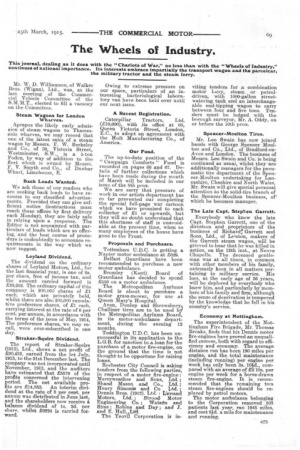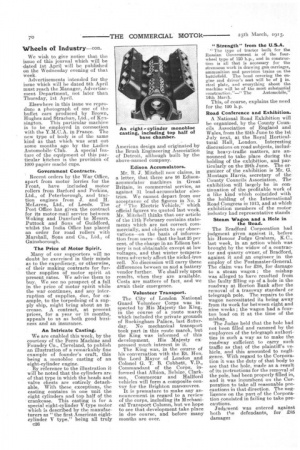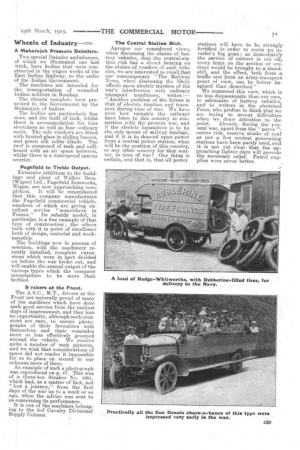The Wheels of Industry.
Page 9

Page 10

Page 11

If you've noticed an error in this article please click here to report it so we can fix it.
This journal, dealing as it does with the " Chariots of War," no less than with the "Wheels of Industry," continues of national importance. Its interests embrace impartially the transport wagon and the parcelcax, the military tractor and the steam lorry.
Mr. W. D. Williamson, of Walker Bros. (Wigan), Ltd., was, at the last meeting of the Commercial Vehicle Committee of the S.M.M.T., elected to fill a vacancy on the Committee.
Steam Wagons for London Wharves.
Apropos the likely early admission of steam wagons to Thamesside wharves, we may record that one of the latest sales of a steam wagon by Messrs. F. W. Berkeley and Co., of 39, Victoria Street, Westminster, S.W., is a 5-ton Foden, by way of addition to the fleet which is owned by Messrs. F. V. Smyth and Co., of Dunbar Wharf, Limehouse, E.
Back Loads Wanted.
We ask those of our readers who are seeking back loads to have recourse to our classified advertisements. Provided they can give sufficient notice (instructions must reach these offices by first delivery each Monday), they are fairly safe in relying upon a response. The Editor is not acquainted with particulars of loads which are so offering, and the best course of procedure is undoubtedly to announce requirements in the way which we now suggest.
Leyland Dividend.
The dividend on the ordinary shares of Leyland Motors, Ltd., for the last financial year, is one of 25. per share, free of income tax, and the amount carried forward is 228,252. The ordinary capital of this company is 200,000 shares of 21 each, which are privately held, whilst there are also 200,000 cumulative preference shares, of 21 each, carrying interest at the rate of 6 per cent. per annum, in accordance with the terms of the .issue of May, 1914, The preference shares, we may recall, were over-subscribed in one day.
Straker-Squire Dividend.
The report of Straker-Squire (1913), Ltd., shows a net profit of 220,432, earned from the let July, 1913, to the 31st December last. The company was not incorporated until November, 1913, and the auditors have estimated that 25579 of the profits concerned the intervening period. The net available profits are 214,853. An interim dividend at the rate of 8 per cent. per annum was distributed in June last, and the shareholders now receive a balance dividend of le. 3d. per share, whilst 26224 is carried forward,
Owing to extreme pressure on our space, particulars of an interesting bacteriological laboratory van have been held over until our next issue.
A Recent Registration.
Caterpillar Tractors, Ltd. (210,000), with its office at 60, Queen Yietoria Street, London, E.C., to adopt an agreement with the Holt Manufacturing Co., of America.
Our Fund.
The up-to-date position of the "Campaign Comforts" Fund is recorded on pages 66 and 67. Details of further collections which have been made during the month of March will be included in our issue of the 8th prox.
We are sorry that pressure of work in our artists department has so far prevented our completing the special full-page war cartoon. which we have promised to each collector of 21 or upwards, but they will no doubt understand that this ehortnes,s of staff is unavoidable at the present time, when so many employees of the house have gone to the Front.
Proposals and Purchases.
Tottenham U.D.C. is getting a Napier motor ambulance at 2629.
Belfast Guardians have been recommended to purchase a new motor ambulance.
Bromley (Kent) Board of Guardians has decided to spend 2550 on a motor ambulance.
The Metropolitan Asylums Board is about to purchase a motor grass-mower, for use at Queen Mary's Hospital.
Avon, Dunlop and Shrewsbury% Challiner tires are to be used 14 the Metropolitan Asylums Board, in its motor-ambulance department, during the ensuing 12 months.
Teddington U.D.C. has been unsuccessful in its application to the L.G.B. for sanction to a loan for the purchase of a motor fire-engine, on the ground that the time is not thought to be opportune for raising loans.
Rochester City Council is asking tenders from the following parties, in respect of a motor fire-engine : Merryweather and Sons, Ltd. ; Shand Mason and Co., Ltd. ; Henry Simonis and Co Ltd. Dennis Bros. (1913). Ltd: : L'eviand Motors, Ltd. ; Strood Motor Engineering Co.' Wats6n and Sims : Robins and. Day; and J. and E. Hall, ,,Ltd. The Yeovil Corporation is in
viting tenclere for a combination motor lorry, steam or petroldriven, with 1000-gallon streetwatering tank and an interchangeable end-tipping wagon to carry between four and five tons. Tenders must be lodged with the borough surveyor, Mr. A. Oddy, on or before the 10th prox.
Spencer-Moulton Tires.
Mr. Leo Swain has now joined bands with George Spencer Moulton and Co., Ltd., of Bradford-onAvon and London. The business of Messrs. Leo Swain and Co. is being continued as usual, whilst they are additionally managers for the pneumatic tire department of the Spencer-Moulton undertaking for Lancashire, Cheshire and North Wales. Mr. Swain will give special personal attention to the solid-tire branch of the Spencer-Moulton business, of' which he becomes manager.
The Late Capt. Stephen Garrett.
Everybody who knew the late Capt. Stephen Garrett, one of the directors and proprietors of the business of Richard: Garrett and Sons, Ltd., of Lein:don, makers. of the Garrett steam wagon, will be grieved to hear that he was killed in action on the 12th inst., at Neuve Chapelle. The deceased gentleman was at all times, in common with other members of his family, extremely keen in all matters pertaining to military service. His loss, at the early age of 36 years, will be deplored by everybody who knew him, and particularly by members of his family and firm, although the sense of deprivation is tempered by the knowledge that he fell in his country's service.
Economy at Nottingham.
The superintendent of the Nottingham Fire Brigade, Mr. Thomas Breaks., finds that his Dennis motor fire-engines have proved an unqualified success, both with regard to efficiency and economy. The average distance run has been 190 miles per engine and the total maintenance (including running) per engine per week has only been 3s. 101d., compared with an average of 22 10s. per engine per week for a horse-drawn steam fire-engine. It is recommended . that the remaining two steam fire-engines should be replaced by petrol motors.
The motor ambulance belonging to the Corporation removed 503 patients last year, ran 1945 miles, and cost 5fd. a mile for maintenance and running, We wish to give notice that the issue of this journal which will be • dated 1st April will be published on the Wednesday evening of that week.
Advertisements intended for the issue which will be dated 8th April must reach the Manager, Advertisement Department, not later than Thursday, 1st April.
Elsewhere in this issue we reproduce a photograph of one of the buffet cars produced by Brown, Hughes and Strachan, Ltd., of Kensington. This particular machine is to be employed in connection with the Y.M.C.A. in France. The new type of body is of the same kind as that which was sent out some months ago by the Ladies AutomobileClub. A special feature of the equipment of this particular kitchen is the provision of 1000 papier mache cups.
Government Contracts.
Recent orders by the War Office, apart from motor lorries for the Front, have included motor rollers from Barford and Perkins, Ltd,, of Peterborough, and traction engines from J. and H. McL.aren, Ltd., of Leeds. The Post Office has given the contract for its motor-mail service between Woking and Dunsford to Messrs. Puttock and Sons of Guildford, whilst the India Office has placed an order for road rollers with Marshall, Sons and Co., Ltd., of Gainsborough.
The Price of Motor Spirit.
Many of our supporters will no doubt be exercised in their minds as to the expediency, or otherwise, of their making contracts for further supplies of motor spirit at present rates. We advise them to buy. We see no prospect of a fall in the price of motor spirit while the war continues, and any interruption of supplies, due, for example,, to the torpedoing of a supply ship, might bring about an increase. A contract, at present prices, for a year or 18 months, appeals to us as both good business and an insurance.
An Intricate Casting.
We are enabled this week, by the courtesy of the Ferro Machine and Foundry Co., Cleveland, to publish an illustration of a remarkably fine example of founder's craft, this being a monobloc casting of an eight-cylinder engine.
By reference to the illustration it will be noted that the cylinders are of that type in which the heads and valve chests are entirely detachable. With these exceptions, the casting contains in one unit the eight cylinders and top half of the crankcase. This casting is for a special eight-cylinder IT-type motor which is described by the manufacturers as "the first American eightcylinder V type," being all truly
026 American design and originated by the Brush Engineering Association of Detroit, although built by the above-named company.
Edison Accumulators.
Mr. R. J. Mitchell now claims, in a letter, that there are 98 Edisonaccumulator machines in Great Britain, in commercial service, as against 31 lead-accumulator electries. We cannot depart from our acceptanee of the figures in No. 2 of "The Electric Vehicle," which official figures we quoted last week. Mr. Mitchell thinks that our article of the 11th February contains statements which are not correct commercially, and objects to our observations—on the basis of information from users—that the last 25 per cent, of the charge in an Edison battery is not obtainable except at low voltages, and that winter temperatures adversely affect the nickel-iron cell. No discussion will carry these differences beween us and a battery vendor further. We shall rely upon results, when they are available. Costs are matters of fact, and we await their emergence.
Volunteer Transport.
The City of London National Guard Volunteer Corps was inspected by His Majesty the King, in the course of a route march which included the private grounds of Buckingham Palace, last Saturday. No mechanical transport took part in this route march, but the King was informed of this development. His Majesty expressed much interest in it. The King was, in the course of his conversation with the Rt. Hon. the Lord Mayor of London and Colonel G. T. B. Cobbett, V.D., Commandant of the Corps, informed that Albion, Belsize, Clarkson, Commerear and Hanford Vehicles will form a composite convoy for the Brighton manceuvres.
It is premature to make any announcement in regard to a review of the corps, including its Mechanical Transport Column, but we hope to see that development take place in due course, and before many months are over.
"Strength" from the U.S.A.
"The type of tractor built for the Russian Uovernment is of the fourwheel type of 120 h.p., and in construction is all that is necessary for the strenuous work in drawing gun carriages, ammunition and provision trains on the battlefield. Tito hood covering the engine and driver's seat will be of f in. steel plate, and everything about the machine will be of the most substantial
construction."—" The Automobile," 14th March.
This, of course, explains the need for the 120 h.p.
Road Conference and Exhibition.
A National Road Exhibition will be organized, by the County Councils Association of England and Wales, from the 25th June to the 1st July next, at the Royal Horticultural Hall, London. Interesting discussions on road subjects, including heavy-traffic matters, are announced to take place during the holding of the exhibition, and particularly on the 29th June. The organizer of the exhibition is Mr. G. Montagu Harris, secretary of the County Councils Association. The exhibition will largely be in continuation of the profitable work of a like kind which coincided with the holding of the International Road Congress in 1913, and at which exhibition members of the motor industry had representative stands Steam Wagon and a Hole in the Road.
The Bradford Corporation had judgment given against it, before his Honour Judge Graham, K.C., last week, in an action which was brought by the widow of a contractor and quarry owner, of Bradford, against it and an engineer in the employ of the Postmaster-General. The claim was for £98, for damage to a steam wagon ; the mishap was alleged to have resulted from the faulty filling up of a hole in the roadway at Horton Bank after the removal of a tramway standard or telegraph pole. The repairs to the wagon necessitated its being away from its work for between eight and nine weeks ; the wagon had a fourton load on it at the time of the mishap.
The Judge held that the hole had not been filled and rammed by the employees of the telegraph authorities in such a way as to make the roadway sufficient to carry such traffic as that of the plaintiff's vehicle, and this amounted to negligence. With regard to the Corporation it was the duty of that body to see that the hole, made as a result of its instructions for the removal of the pole, had been properly filled in, and it was incumbent on the Corporation to take all reasonable precautions in that direction. The negligence on the part of the Corporation consisted in failing to take precautions.
Judgment was entered against both the defendants, for £85 damages A Maharajah Presents Daimlers.
Two special Daitnler ambulances, of which we illustrated one last week, have bodies that were constructed in the wagon works of the East Indian Railway, to the order of the Indian Government.
The machines are intended for the transportation of wounded Indian soldiers in Bombay.
The chassis complete were presented to the Government by the Maharajah of Indore.
The bodies are particularly fine ones, and the built of teak, whilst there is accommodation for four stretchers as well as four ordinary seats.. The side windows are fitted with frosted glass in sliding frames, and green silk roller blinds. The roof iseomposecl of teak and millboard with an air space between, whilst there is a waterproof canvas overlay.
Pagefield to Treble Output.
Extensive additions to the buildings and plant of Walker Bros. (Wigan) Ltd., Pagefield Ironworks, Wigan, are now approaching completion. It will be remembered that this company manufactures the Pagefield commercial vehicle, numbers of which are giving excellent service "somewhere in France." Its subsidy model, in particular, is a fine example of that type of construction ; the others rank with it in point of excellence both of design, material and workmanship.
The buildings now in process of erection, with the machinery recently installed, complete extensions which were in part decided on before the war broke out, and will enable the annual output of the various types which the company manufacture to be more than trebled.
S'rakers at the Front.
The A.S.C., MT., drivers at the Front are naturally proud of many of the machines which have done such good service from the earliest days of impressment, and they lose no opportunity, although such occasions are rare, to secure photographs of their favourites with themselves and their comrades more or less effectively grouped around the vehicle. We receive quite a number of such pictures, and we wish that considerations of space did not render it impossible for us to place on record in our columns more of them.
An example of such a photograph was reproduced on p. 47. This was of a three-ton Straker No. 1091, which had, as a matter of fact, not "lost a journey," from the first days of the war up to a week or so ago, when the advice was sent to us concerning its performance.
It is one of the machines_belonging to the 3rd Cavalry Divisional Supply Column. The Central Station Risk.
Apropos our considered views, when discussing the claims of battery vehicles, that the central-station risk has a direct bearing on the claims of vendors of such vehicles, we are interested to recall that our contemporary "The Railway News, when discussing the likely effects upon electric traction of the war's interference with ordinary transport conditions, writes :— "Another problem of the future is that of electric traction and transport during time of war. We have seen how valuable the railways have been to this country in connection with the present war, and if the electric locomotive is to be the only means of aailway haulage, and if it is to depend upon power from a central power station, what will be the position of this country, or any other country for that matter, in time of war ? One thing is certain, and that is, that all power
stations will have to be strongly fortified in order to resist an invader's big guns ; as immediate!y the service of current is cut 'off, every train on the section or sec. tions would be brought to a standstill, and the effect, both from a traffic and from an army-transport point of view, can be better imagined than described."
We commend this view, which is no less dispassionate than our own, to advocates of battery vehicles, and to writers in the electrical Press, who profess to think that we are trying to invent difficulties when we draw attention to the
point. Already, during the present war, apart from the "nerve "centre risk, reserve stocks of coal at not a, few central generating stations have been partly used, and it is not yet clear that the approaching lighter days will provide the necessary relief. Petrol supplies were never better.




















